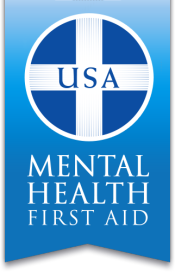Mental health experts in Georgia say federal spending cuts will weaken a program that trains ordinary citizens to provide “first aid” for a person experiencing a mental health crisis.
The December 2012 Connecticut school massacre moved mental health issues up the agenda for the Obama administration and Congress. (Despite this Connecticut case, people with mental illness are generally not violent, experts say.)
After the Sandy Hook shootings, Congress increased the budget of the Substance Abuse and Mental Health Services Administration (SAMHSA), the federal agency whose job is to reduce the community impact of substance abuse and mental illness.
In 2014’s omnibus budget, Congress also set aside $15 million for a community based awareness program called Mental Health First Aid.
But SAMHSA’s total budget in 2015 will be cut by about $40 million, and Georgia will feel it.
“Any time there’s a cut for mental health funding, it hurts everyone,” said Ellyn Jeager, director of public policy and advocacy at Mental Health America of Georgia.
During the past year, Georgia programs received more than $6.3 million from SAMHSA for a spectrum of behavioral health programs. Now, according to the National Council for Behavioral Health, that amount will fall, and Mental Health First Aid will be one of the programs hit.
In the Mental Health First Aid program, commonly known as MHFA, certified instructors teach participants a wide range of practical information about various mental conditions. In the eight-hour course, the participants learn how to spot signs of depression, anxiety, bipolar disorder and other common mental illnesses; how to have a conversation with someone who may have one of these disorders; and how to intervene during a crisis.
The instructors also guide the participants through role-playing exercises, such as how to engage with someone who may be contemplating suicide.
People who attend MHFA classes often report that learning first aid for mental health problems is far more useful than learning to improvise a neck brace or bandage a wound, said instructor Marti Vogt. She has taught MHFA at the Perimeter Church and Suicide Prevention Coalition in Johns Creek for four years, and has 34 years’ experience working with suicide prevention hotlines and support groups.
MHFA, an international program founded in Australia 13 years ago, was introduced to Georgia by the state Department of Behavioral Health and Developmental Disabilities in 2010. The DBHDD funds training sessions provided by two contractors — Mental Health America of Georgia and the Georgia Mental Health Consumer Network. The state also collects data used to evaluate these programs.
Practical lessons
MHFA is not the only training method of its kind.
Advantage Behavioral Health, the community service board for health district 10 (Barrow, Clarke, Elbert, Greene, Jackson, Madison, Morgan, Oconee, Oglethorpe and Walton counties), is using a less expensive alternative called Mental Health 101.
“We determined that the funds are now limited” for MHFA, said Sherrie Maxwell, chief operating officer at Advantage.
The Mental Health 101 program teaches essentially the same things as Mental Health First Aid, but in less than the eight hours required for the MHFA course.
Hands-on practice is the key to Mental Health 101. For instance, to understand the problems of people who hear voices in their heads, the participants try to converse with one another while wearing headphones that play totally unrelated speech.
Most funds go to schools
While some turn to the alternative program, DBHDD recently moved to expand Mental Health First Aid. It drew $12,354 from SAMHSA’s Mental Health Block Grant to train one new MHFA instructor and add five training sessions to the Georgia Mental Health Consumer Network’s calendar.
These sessions will serve clergy, police and fire personnel, and others who have frequent contact with the public. This community focus is unusual because most such money distributed by SAMHSA goes to school-based training.
“Mental Health First Aid for adults doesn’t have that kind of targeted funding source,” said Sally vander Straeten, coordinator for the state agency’s suicide prevention program.
SAMHSA’s grants to two school systems, for example, surpass statewide spending on Mental Health First Aid programs for adults. In September, the agency awarded $99,982 to Fulton County schools to train almost 800 counselors and teachers in MHFA. The grant aims to bring “mental health literacy” to underserved student groups, such as people whose first language is not English and children who live below the poverty line.
“By improving mental health literacy among these student subgroups, we can begin to remove barriers to needed mental health treatment,” said Chris Matthews, director of counseling, psychological services, and social work for Fulton County.
Likewise, Rockdale County received $99,865 to train 420 school staff members and other individuals in “youth-serving agencies” over two years.
Most training classes take place in metro Atlanta, including in Covington, Cumming, Stone Mountain, Snellville, Norcross, and McDonough. For more information, visit http://www.mentalhealthfirstaid.org/cs/take-a-course/find-a-course/
“People don’t really know that much about mental illness . . . the stigma still exists,” said Vogt. “That’s why it’s important to talk about mental health [through MHFA], to help reduce the stigma.”
Lee Adcock is a master’s degree health and medical journalism student at the University of Georgia. She is also a music critic for various media outlets.


